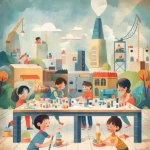Multi-Grade (K-6)
Engineering Discoveries
STEM is an integrated approach to learn about science, technology, engineering and math.
Curricular Highlights
- Explorations: These programs embed the competencies of critical thinking, problem solving, managing information, creativity, innovation, communication, collaboration and personal growth and well-being. Students use knowledge and strategic skills to apply the engineering and design process to solve challenges.
- Theme: Program-dependent (see below)
- Grade: Multi-Grade
- Categories: Science, STEM
Enhance your learning experience!
This program can be delivered as:
In-School Field Trips
Description: These programs embed the competencies of critical thinking, problem solving, managing information, creativity, innovation, communication, collaboration and personal growth and well-being. Students use knowledge and strategic skills to apply the engineering and design process to solve challenges.
Format: Our experienced presenters deliver curriculum-based field trips right in your classroom.
Duration: 2 hours
Volunteers: Program-dependent
Teacher Provides: N/A
Take Home:
N/A
Available Programs
There are 14 programs available for Engineering Discoveries:
Transportation (K-2)
Through storytelling, movement and hands-on activities, students are engaged in creating a variety of modes of transportation using specialized materials. Students will explore early science principles in an interactive way.
Recommended Volunteers: 1 per 4 students
Long Haul (K-2)
Students will explore what it means for something to be strong and the relationship between weight, strength, load and reinforcement. Then, they will apply this knowledge as they learn how to make “work” easier when moving a load as they build, test and improve a flatbed truck.
Recommended Volunteers: 1 per 4 students
Measurements, Patterns, Pyramids & Symmetry (K-2)
Students learn about engineers and what they do, then will use this knowledge as they explore patterns and symmetry through the creation of pyramids.
Recommended Volunteers: 1 per 4 students
Push & Pull (K-2)
Students will build a tractor then explore how forces, like pushes and pulls, can be used to move objects.
Recommended Volunteers: 2-4
Strong, Secure Castles (K-4)
Students use their engineering skills to build and test a castle wall, then improve on the design to make it stronger. Once they have a strong wall, they must design a door that will open and close as well as be secure.
Recommended Volunteers: 1 per 4 students
Strong, Stronger, Strongest! (K-6)
Students will be immersed in the design & engineering process to solve a challenge. Students will create, test and modify original plans to improve the integrity of their designs. They will present their creations to their peers.
Recommended Volunteers: 1 per 4 students
Bridges (2-6)
By examining bridge design, students will recognize different forces acting on a bridge, types of bridges and how they work. As a team, students will have an opportunity to build and test their own bridge.
Recommended Volunteers: 1 per 4 students
Inclined Plane (3-6)
Students will learn how an inclined plane works then build and modify a model. Presented with an interesting challenge, students will use their design and engineering skills to solve a real world problem.
Recommended Volunteers: 2-4
Levers (3-6)
Students will be actively engaged in learning about 1st, 2nd, and 3rd class levers and mechanical advantage as they build, test and modify a model of each type. Students will use their knowledge to design and engineer a custom lever to solve a variety of challenges.
Recommended Volunteers: 2-4
Pulleys (3-6)
Students will explore the fundamentals of a pulley system and how to create mechanical advantage. By designing and engineering a custom pulley system, students will be able to apply their knowledge to solve a challenge.
Recommended Volunteers: 2-4
Screw (3-6)
Students will learn that a screw is an inclined plane wrapped around a cylinder that can either push, pull or hold materials together. Through exploring real life applications, students will build a model. Presented with a challenge, students will design and engineer a solution.
Recommended Volunteers: 2-4
Simple Machines Combo (3-6)
If you’re having trouble deciding which simple machine(s) to explore, this is the program for you! In just two hours, your students will test each of the following systems: levers, wheel & axle, inclined plane, pulley, wedge and screw and then create their own design using one or more of these simple machines.
Recommended Volunteers: 2-4
Wedge (3-6)
What is a wedge and how is it used in real life applications? Can a wedge be modified to increase mechanical advantage? These concepts and more are explored as students design, build, modify and engineer a wedge model and then use this information to create a specialized wedge to solve a challenge.
Recommended Volunteers: 2-4
Wheel & Axle (3-6)
Real life applications will be explored as students learn about the wheel & axle. Students will build and modify a model as they explore the basic elements and purpose of this simple machine and discover how mechanical advantage is used. By applying this knowledge, students will be able to design and engineer a custom wheel & axle to solve a challenge.
Recommended Volunteers: 2-4
Wheels & Levers (3-6)
Students will construct models of levers as well as devices that use wheels & axles. Acquired knowledge will be put to use solving everyday challenges!
Recommended Volunteers: 2-4
What Teachers Are Saying
Price
$ 14.00
per student(Minimum Fee $210.00)









